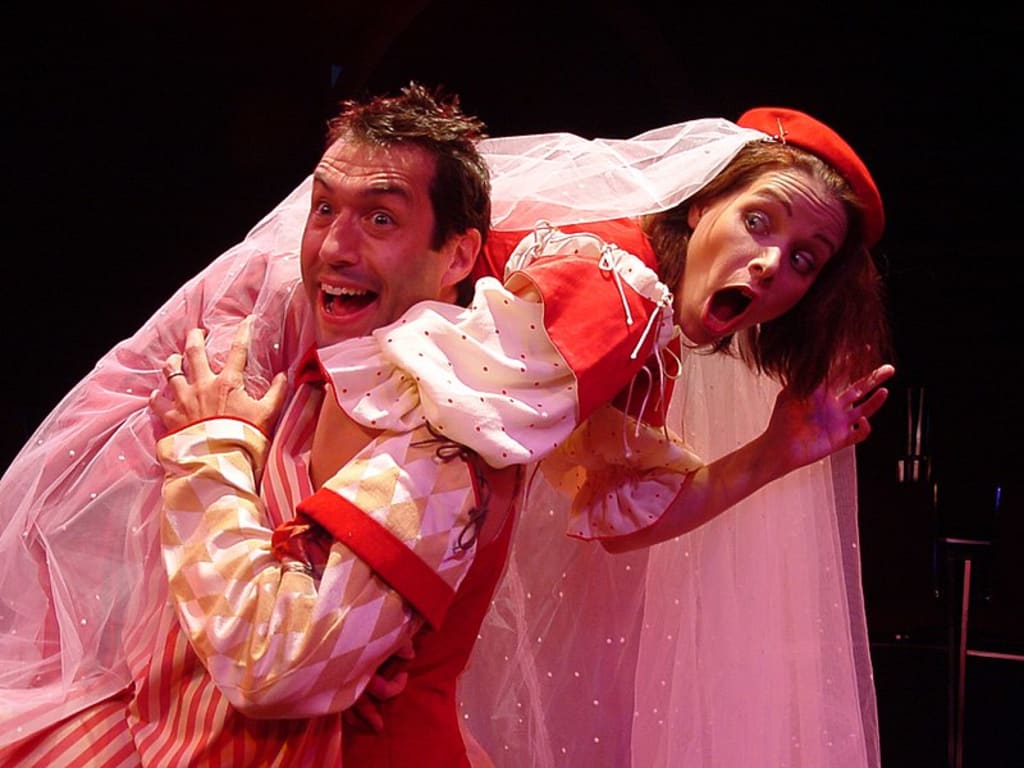The Duties of an Elizabethan Woman:
Kate's Final Speech from the Taming of the Shrew

The Taming of the Shrew by William Shakespeare is a comedic play about men and women in Elizabethan society who are playing parts and are pretending to be everything but what they really are in order to marry and continue the current social order.
The two major females Kate and Bianca, represent the proper role of a woman and the improper shrew of a woman. These were really the primary choices for an Elizabethan woman. Bianca is everything an Elizabethan woman should be. She is modest, chaste, fragile, beautiful, and obedient.
A woman is beauty itself and “no scornful glances” (137) should be given to your husband. They “blot thy beauty.” It “confounds thy fame.” It is not amiable.” (136-141). A woman was beauty, submission, and loyalty. She was property, a possession belonging to one man or another through out her life.
Or according to the standards of the day, that's what she should be. She should "Kneel for peace.” With bodies “soft, weak, (and) smooth," (165) women are “bound to serve, love, and obey” (164). Bianca is all of these things, or at least she gives the appearance that she is all of these things. Bianca is an amiable proper woman. Kate is not.
Kate is everything a proper woman shouldn't be. She has chosen a role so far from proper that she is considered to be a shrew, and by the very definition she is an animal rather than a human being. The shrew is "froward, peevish, sullen, sour, disobedient, foul contending, (and) graceless” (157-160).
She is curst. She is an evil of the devil rather than the angel on a pedestal that a woman should be. She has beauty, but it doesn't matter. She isn't playing the part that goes with it. She is willful, disobedient and talkative. She is public, active, and decidedly defiant. She is not a proper Elizabethan woman.
While Kate recognizes that the woman's role is a part to be played, she refuses to play it. She takes on the role of shrew and finds that it is also a part. It doesn't quite fit her either, but it is the only other choice she can choose from. This choice leaves her almost as frustrated as the role of the proper woman would have left her.
Kate's Final Speech is spoken after the men and women have been married and are having a celebratory feast. The men make a bet about their wives, and then summon them to see who actually shows up. All three men boast about their ability to control their wives, but two of the women refuse to come immediately.
Kate is the one character who responds to the summons without an argument. When the others arrive, she chastises them with this speech on the duties of a good Elizabethan woman.
The character of Kate the shrew started off the play as willful, opinionated, and known for it publicly. By the end of the play she is giving a speech to other women about the importance of a woman's submission to her husband. Why does she make this speech?
Kate is espousing Elizabethan rhetoric, but has she really been transformed or is she merely playing the part everyone else has expected of her from the very beginning?
Perhaps both she and Petruchio have agreed to play their parts, their roles in society, and this speech can be taken as the culmination of a game being played between Kate and Petruchio. They form a united front in the public arena. They both know that they are playing a part, but their united front makes them correct in the social scheme of things.
These two characters have a physical attraction between them, and a mental bond as well. They have found that they are good sparring partners. Kate has found someone with whom she can share the joke of Elizabethan society and its many roles that are imposed on everyone.
Perhaps Kate has learned she even has some power in her relationship with Petruchio. Power she might not have if she were joined to anyone else. This would allow her to choose to be tamed, making it not an issue of force, but of choice.
It also could also simply be that Elizabethan play goers may have expected a tamer Kate by the end of the play, whether they took the idea of it seriously or not. It is possible that the taming of women was simply a funny idea to Shakespeare's audiences, and they didn't expect a serious speech at the end of a fun comedy.
It's questionable that a modern audience would take this speech seriously. It is also questionable whether Elizabethan audiences were taking this seriously either.
Kate's Final Speech scans out predominantly as unrhymed iambic family pentameter. One could also say that while most of the speech appears to be unrhymed, Shakespeare has made liberal use of the slant- or off rhyme. Most of the line endings have same letter endings, making heavy use of consonance to make the rhymes work.
Some of these paired endings include: meads/buds, beauty/thirsty, amiable/troubled, land/cold, and will/rebel. He also uses assonance, or vowels, along with consonance in Care the line endings worms/yours, and compare/are. The beginning of the speech is filled with the consonant sounds “K”, in nok sound.
Here "z", "th”, and “N” that run through the line: “unknit that threat'ning unkind brow” (136), and gives the reader a taste of the iambic pentameter that runs through the speech.
Another poetic device is the simile, a comparison using like or as to compare “a woman moved” to “a fountain troubled" (139). A fountain has a particular job and that is to produce a smooth flow of liquid. When the fountain is troubled it doesn't do what it is supposed to. A woman moved, a woman stirred up, also doesn't do what she is supposed to if you believe Shakespeare's lines here.
Lines 139-145 continue the metaphor in an extended version of the "troubled fountain.” There is a clear contrast made between the wet images of a working fountain versus the dry images of a “troubled fountain.” In this passage are the wet images of "frost, meads, fountain, muddy, thick.” This contrasts with “bereft, dry, thirsty, sip, and drop" (139-145).
He also uses good contrast between night and day in the line “To watch the night in storms, the day in cold, whilst thou li'st warm at home” (150-151). This line emphasizes the idea of a man “commit(ting) his body" (148) in service to the women in his life.
Toward the end of the speech, there are 5 sets of couplets that finish it off with a brief summation of the woman's place in relation to her husband as the same relationship between a Prince and his subjects. “Such duty as the subject owes the prince” (155), a woman owes her husband. A husband is “lord, king, governor” (38). “Thy lord, they life, thy keeper" (146).
It is his job to "commit his body” (148) and “honest will” (148) to maintain, protect, and care for the women in his life. This means a woman owes “Love, fair looks, and true obedience" (153) to her husband, and should not seek for rule, supremacy, and sway
When they are bound to serve, love, and obey."(163-164).
“But that our soft conditions and our hearts should well agree with our external parts?" (167-168) "Our Strength as weak, our weakness past compare, That seeming to be most which we indeed least are.” (169 170).
Here one could make an argument for Kate and Petruchio's collusion. With this reference to seeming and being, she lets us know that she knows the role is about pretending to be something other than what you are, but that also, it's about parts everyone, both males and females have to play.
These lines could also speak to a biological argument for the submission of woman. Biology really is destiny here, and can be used to keep women in a submissive position.
Then vail your stomachs, for it is no boot, And place your hands below your husband's foot; In token of which ready duty, if he please, My hand is ready, may it do him ease” (174-178).
Here at the end of the speech, Kate has done her duty publicly, and will be given the kiss that is her reward for conforming to the very same social rules she had chosen to abandon at the beginning of the play.
Perhaps Petruchio is quick to reward Kate because he knows she recognizes, as he does, the difference between seeming and being, but finishes the speech in character with the part she is playing anyway.
This speech sums up the place and duty of an Elizabethan woman, but even as Shakespeare was writing, there were women and men who were busy challenging those notions of duty that were expected to be played out.
But in their plays perhaps they felt it was good to have the chance to laugh at these assigned roles. That may not have always been a possibility in the day-to-day living of the average Elizabethan play-goers.
About the Creator
CL Robinson
I love history and literature. My posts will contain notes on entertainment. Since 2014 I've been writing online content, , and stories about women. I am also a family care-giver.
Enjoyed the story? Support the Creator.
Subscribe for free to receive all their stories in your feed. You could also pledge your support or give them a one-off tip, letting them know you appreciate their work.






Comments
There are no comments for this story
Be the first to respond and start the conversation.